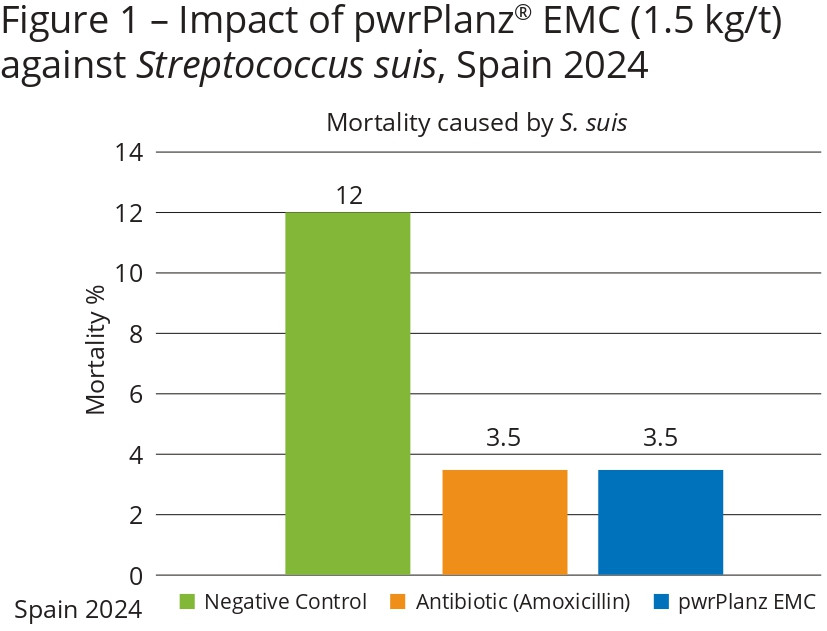Gastrointestinal diseases pose a serious threat to commercial pig production. In the past, this hazard was controlled by the prophylactic use of antibiotics. However, animal production is viewed critically for its use of in-feed antibiotics, both by consumers and regulatory authorities. As a result, various feed additives have been studied as alternatives.
Currently, there is growing interest in natural alternatives such as bioactive compounds, which are characterised by high food safety as well as consumer acceptance. Plant secondary metabolites, as one solution, are natural active compounds obtained from various herbal sources, such as spices and plants (plant extracts), and are also referred to as botanicals or phytogenics.
Numerous herbal products have been shown to have beneficial effects and medicinal properties, including antimicrobial, antioxidant, anti-inflammatory, and immunomodulatory activities without adversely affecting growth and feed efficiency. They are therefore used as growth-promoting feed additives in livestock production. ADDCON, a part of Esseco Industrial, has currently intensified its R&D efforts in this direction and has recently launched the product range pwrPlanz as feed supplements for livestock. Specifically, pwrPlanz EMC (hereafter abbreviated as EMC) is a highly concentrated product, which consists of a mixture of aromatic compounds with medium and macro-chain fatty acids and functional fibre.
The distinctive combination of these plant extracts, including uneven medium chain fatty acids, naturally optimises livestock production, especially due to improved animal performance and animal health status. EMC is efficiently supporting gut health in animals, by a strong antimicrobial effect against pathogenic bacteria and improving the gut morphology. This leads to a stabilised gut microbiome – and thus improved performance.
Several independent publications revealed that medium-chain fatty acids, particularly fatty acids with a chain length of 6-12 carbon atoms, are known to be good antimicrobials (antibacterial and antiviral effect), as well as gut health and growth promoters when used as feed additives in pig production.
Laboratory antimicrobial tests
The first laboratory antimicrobial tests of EMC produced the expected results in terms of pathogenic bacteria and enveloped viruses. The results of minimum inhibitory concentration (MIC) testing showed a strong antibacterial effect of EMC against the most common pathogenic gram-positive bacteria (Table 1).
In addition, the impact against Methicillin-resistant Staphylococcus aureus (MRSA) under laboratory conditions was seen at 2.5 g/L, which further demonstrates the power of the product. It is therefore no surprise that the product has beneficial effects on pigs under challenging farm conditions. A study in piglets with a starting weight of 5.45 kg over a period of 35 days after weaning showed that EMC leads to an improvement in all production parameters (Table 2).
Confirming impact
EMC has been shown to be a solution for combating severe bacterial infections caused by pathogenic gram-positive bacteria under laboratory conditions. A decision to confirm this impact under field conditions was therefore needed.

This effect of EMC was confirmed in a study of 6,000 weaned piglets, where the product reduced the mortality of severely infected piglets caused by Streptococcus suis. Amoxicillin, as advised by veterinarians, served as a positive control with a special permit from local authorities (Figure 1). The results proved a similar impact to the used antibiotic.
The latest data from Germany reproduced the Spanish results: under commercial post-weaning conditions with Streptococci incidences, the use of EMC reduced mortality to only 2.6%, in the absence of veterinary-prescribed antibiotics.
Effect against enveloped viruses
Finally, as literature reports indicated a possible anti-viral effect of products containing medium-chain fatty acids, EMC was tested in this regard as well. The effect on enveloped viruses has been confirmed in testing the product against the Classical Swine Fever virus in commercial pig feed, where results showed 100% reduction of virus titre in less than 24 hours.
Broad impact
To summarise, the product has a broad impact against gram-positive bacteria; as such, pwrPlanz EMC can be an important tool in any antibiotic reduction strategies, thus supporting sustainable animal production. Therefore, the product can be part of the “One Health” approach of the EU for reducing the risk of antimicrobial resistance. The additional anti-viral impact may help in inhibiting viral disease transmission via the vector feed – thus, as an overall concept, pwrPlanz EMC can be considered a good and sustainable strategy for healthier and more profitable pig production.

